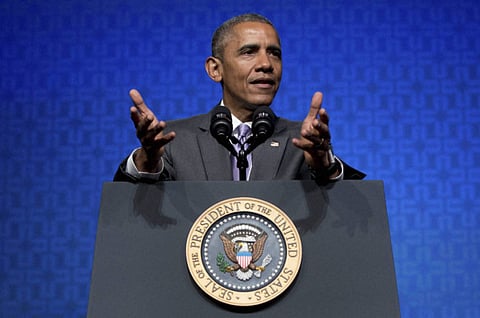Will Obama recognise the state of Palestine?
Such a step will protect Palestinian people from Israeli aggression

What has been most frustrating is the failure of the leaders of the so-called G7 industrialised nations — the US, France, Germany, Britain, Italy, Japan and Canada — to focus on the Palestinian-Israeli problem at their meeting this week in Germany. This is the leading issue that has troubled the Middle East for 67 years — that is, since the founding of the state of Israel.
Much as the other immediate concerns of the group are significant, the apparent reluctance of some of the top leaders, especially US President Barack Obama, is inexcusable, since his term in office will be ending a little over a year. He presumably fears that pro-Israel Congressmen may cripple the anticipated agreement with Iran.
The discussions, in part, were reportedly “dominated by the question of how to address Russia’s continued aggression in Ukraine”, something that is undoubtedly minor when compared to what Israel has done in Palestine. Its continued occupation of 60 per cent of the West Bank, especially Jerusalem, has hardly yielded any significant international condemnation. In May 2014, the Israeli Housing Minister, Uri Ariel, who himself lives in the West Bank colony of Kfar Adumim, put the illegal Jewish colonist population at up to 750,000, including about 400,000 in the West Bank and up to 350,000 in occupied Arab East Jerusalem, where the Palestinians hope to establish their capital.
Former US president George W. Bush had said seven years ago that “the establishment of the state of Palestine is long overdue” adding that the Palestinian people “deserve it and it will enhance the stability of the [Middle East] region”. Despite the fact that the tide internationally is turning against Israel, which now has an extreme rightist government, Israeli leaders seem to have their heads buried in the sand. For example, Naftali Bennett, the influential Education and Security Minister of Israel, and whose party is described as one of the bigger partners in the Israeli cabinet, is now advocating that the world recognise Israel’s 1981 annexation of the occupied Golan Heights, a strategic Syrian region overlooking Israel.
Another example of Israeli aggression is its current plan to remove a village from the West Bank’s Area C, which is dominated by illegal Israeli colonists and under Israeli military control, to Area B, inhabited by Palestinians. An Israeli court is now looking into the issue, but has reportedly failed to approve an injunction to prevent the demolition of the village, home to 340 Palestinians.
Last Monday, the Washington-based Institute for Research: Middle Eastern Policy (IRmep) released an opinion poll that revealed that nearly 65 per cent of Americans believe that “Israel’s clandestine nuclear weapons programme should be officially acknowledged and almost 55 per cent believe that the programme should be subject to international inspections”. The poll was fielded between June 4 and 6 by Google Consumer Survey and received 1,518 responses.
After a visit earlier this month to Gaza, the Czech Foreign Minister, Lubomir Zaoralek, was reportedly “shocked by local conditions” in the wake of the Israeli war last year on the Palestinian territory controlled by Hamas. He said he planned to discuss the situation with the Israeli leaders. The 50-day war resulted in the deaths of at least 2,200 Palestinians and 73 Israelis. The signs of the war are apparent all over Gaza. About 100,000 persons are still living outside their original homes. The minister said “the most terrifying for me was to hear how many children suffer from all types of post-traumatic syndromes and how many children have lost their parents”.
Obviously, the best thing that the US can do in this respect is to announce its recognition of the state of Palestine, a step that will protect Palestinians from Israeli aggression. So far 135 countries have taken that step.
But a report titled ‘Israel’s Shield’ in Foreign Policy, a leading American magazine, had this opening paragraph: “Samantha Power, the US Ambassador to the United Nations, has appealed to United Nations Secretary-General Ban Ki-moon to remove Israel from a draft UN rogues list of government forces, rebel movements and terrorist organisations accused of violating children’s rights in the midst of conflict, according to officials familiar with the US envoy’s confidential discussions with the UN leader.”
George S. Hishmeh is a Washington-based columnist. He can be contacted at ghishmeh@gulfnews.com
Sign up for the Daily Briefing
Get the latest news and updates straight to your inbox



